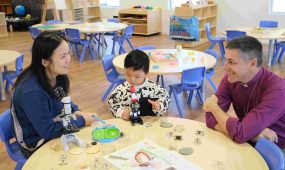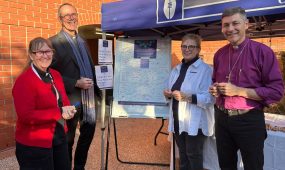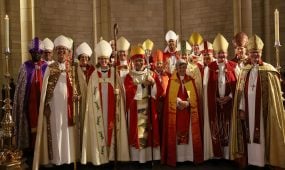The Springfield Anglican College creating a buzz over beekeeping
Local
The Springfield Anglican College’s students are fostering environmental awareness, while learning beekeeping and honey extraction skills, as part of the College’s commitment to sustainability
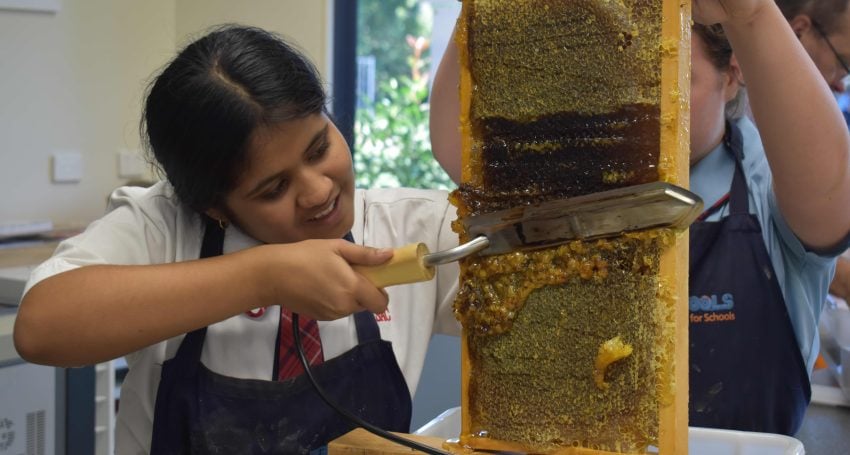
The Springfield Anglican College’s (TSAC’s) students are fostering environmental awareness, while learning beekeeping and honey extraction skills, as part of the College’s commitment to sustainability.
From Kindergarten, TSAC students learn about bees’ vital role in pollination, and the difference between honey bees and native bees, of which the College maintains hives on the Primary Campus.
Students in senior primary years study the environmental impacts of bees and factors that continue to endanger bee colonies around the world.
One of the most exciting programs offered by TSAC is the Secondary Campus Bee Keeping Club.
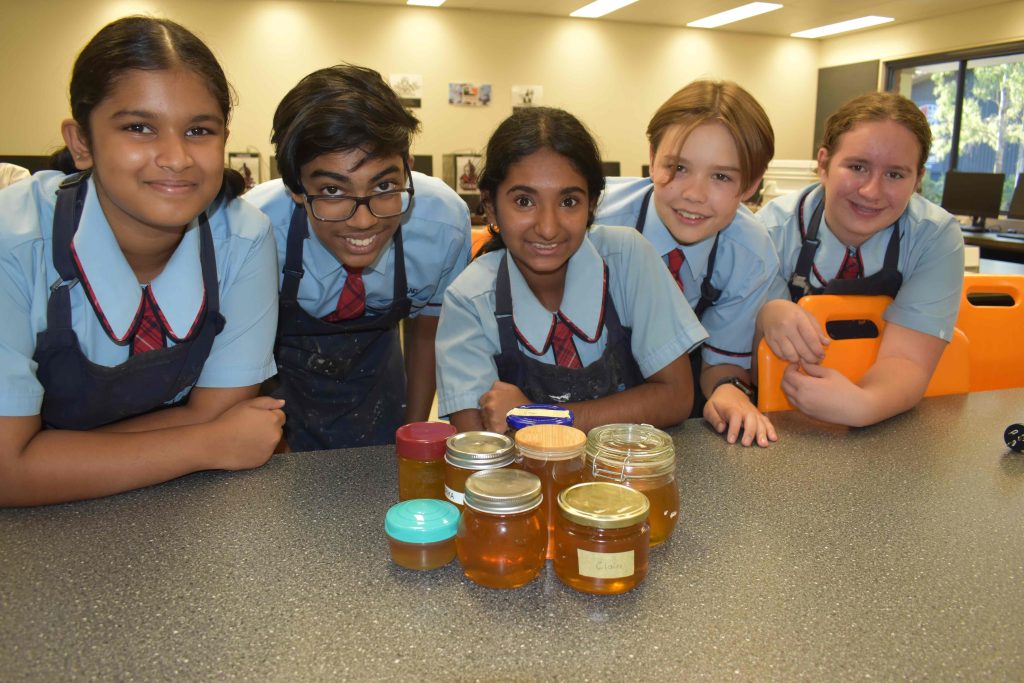
Student beekeepers (L-R) Vrinda Anoop (Year 8), Hamish Bissessur (Year 8), Christina Thomas (Year 8), Riley McAuliffe-Winton (Year 8) and Georgia Winstanley-Bowring (Year 8) harvesting TSAC honey at The Springfield Anglican College in March 2023
This agricultural program is offered as a weekly co-curricular activity and enables students in Years 7 to 12 to delve into the fascinating world of bees and honey production.
The TSAC Bee Club is led by teacher Jeffrey Coleman, who seeks to create an engaging, hands-on learning environment.
“The College’s Bee Club was formed in 2022 and has been brought to life by our passionate student beekeepers,” Mr Coleman said.
“At the start of the Bee Club, students built boxes and hive frames, and painted the hives in weather-protective paint for our colony of honey bees.
Advertisement
“They have designed signs, honey jar labels, and other materials to sustain a thriving beehive apiary for our College community to enjoy and learn about bees.”
Year 11 student Ginni Shukla has been a part of the Bee Club since its inception.
“Bees are such a crucial part of our environment that our ecosystem would struggle without them,” Ginni said.
“They are fascinating creatures that should be respected for their unity, hard work, and contribution to the world.
“Bee Club is a great opportunity where I get to connect with my peers and learn new skills.
“Interacting with the bees is one of the best parts of the Bee Club.”
With expert guidance from Mr Coleman, students are developing a deep understanding of the delicate balance between humans and bees, and learning about responsible beekeeping, setting up beehives, managing colonies and how to harvest honey.
Mr Coleman said that TSAC students gain practical knowledge about the art of beekeeping, while nurturing their interest in environmental stewardship.
Advertisement
“They learn about the significant impact of bees on our lives and the environment, and the vital role bees play in pollination, food production and maintaining biodiversity,” he said.
Over the past months, students have decapped the wax from the hive frames, and spun the frames in an extraction drum to remove the honey.
They then ran the honey through a filter before filling sterilised jars and taste-testing the sweet fruits of their labour.
Year 8 student Christina Thomas said that she had a hurdle to overcome before learning to appreciate bees.
“Bee Club is cool — at first, I was a little scared, after I visited the beehives, I got over my fear of the bees,” Christina said.
“I’ve learnt that they are pretty much harmless to us.
“Bees do so much for our ecosystem, and the Bee Club tries to help as much as we can to make their job a little easier.”
Fellow Year 8 student Vrinda Anoop said that the initiative has opened her eyes to beekeeping’s many aspects of.
“I’ve learnt so many things since joining the Bee Club,” Vrinda said.
“I’ve learnt what happens in the beehive, and the importance of a queen bee.
“I’ve learnt how honeycomb forms and when it’s ready to be extracted.
“I’ve also learnt how to extract honey from frames.”
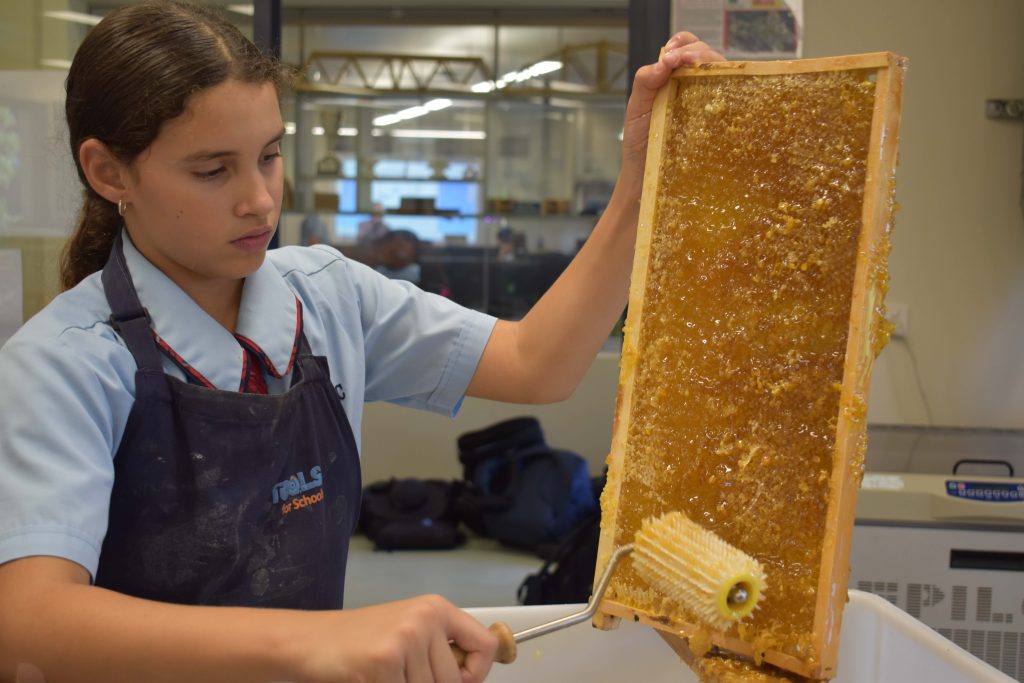
Year 7 student beekeeper Claire Scott continues the extraction process, using a special roller to break up the wax and release the honey at The Springfield Anglican College in March 2023
The College’s hives are located in the outer bushland on the Secondary Campus and are an essential part of the local environment’s ecology.
The bees source nectar from the wide variety of wild flora around the Campus and surrounding creek bushland reserve.
For more information about various clubs available for students to join at The Springfield Anglican College, visit the College’s website.

